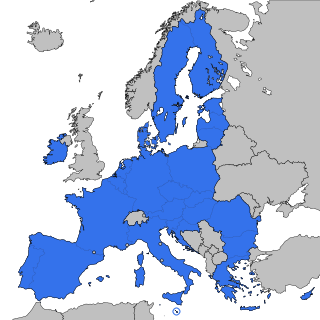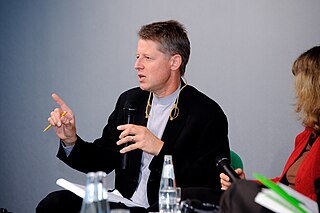In international relations, intergovernmentalism treats states as the primary actors in the integration process. Intergovernmentalist approaches claim to be able to explain both periods of radical change in the European Union because of converging governmental preferences and periods of inertia because of diverging national interests. Intergovernmentalism is distinguishable from realism and neorealism because it recognized the significance of institutionalisation in international politics and the impact of domestic politics upon governmental preferences.

The federalisation of the European Union describes processes and proposals by which the European Union (EU) could be transformed from an informal confederation into a federation. There is ongoing discussion about the extent to which the EU has already become a federation over the course of decades, and more importantly, to what degree it should continue to evolve into a federalist direction. As of October 2022, the EU has no formal plans to become a federation.

International relations (IR) are the interactions among sovereign states. The scientific study of those interactions is called international studies, or international affairs. In a broader sense, it concerns all activities between states—such as war, diplomacy, trade, and foreign policy—as well as relations with and among other international actors, such as intergovernmental organisations (IGOs), international nongovernmental organisations (INGOs), international legal bodies, and multinational corporations (MNCs). There are several schools of thought within IR, of which the most prominent are realism, liberalism, and constructivism.
International relations theory is the study of international relations (IR) from a theoretical perspective. It seeks to explain behaviors and outcomes in international politics. The four most prominent schools of thought are realism, liberalism, constructivism, and rational choice. Whereas realism and liberalism make broad and specific predictions about international relations, constructivism and rational choice are methodological approaches that focus on certain types of social explanation for phenomena.
A confederation is a union of sovereign groups or states united for purposes of common action. Usually created by a treaty, confederations of states tend to be established for dealing with critical issues, such as defence, foreign relations, internal trade or currency, with the central government being required to provide support for all its members. Confederalism represents a main form of intergovernmentalism, defined as any form of interaction around states that takes place on the basis of sovereign independence or government.
Neofunctionalism is a theory of regional integration which downplays globalisation and reintroduces territory into its governance. Neofunctionalism is often regarded as the first European integration theory developed by Ernst B. Haas in 1958 as part of his Ph.D. research on the European Coal and Steel Community. Neofunctionalism seeks to explain the European integration process and why states accept to become a part of supranational organization. Jean Monnet's approach to European integration, which aimed at integrating individual sectors in hopes of achieving spillover effects to further the process of integration, is said to have followed the neofunctional school's tack.
European integration is the process of industrial, economic, political, legal, social, and cultural integration of states wholly or partially in Europe or nearby. European integration has primarily come about through the European Union and its policies.
A supranational union is a type of international organization that is empowered to directly exercise some of the powers and functions otherwise reserved to states. A supranational organization involves a greater transfer of or limitation of state sovereignty than other kinds of international organizations.
Regime theory is a theory within international relations derived from the liberal tradition that argues that international institutions or regimes affect the behavior of states or other international actors. It assumes that cooperation is possible in the anarchic system of states, as regimes are, by definition, instances of international cooperation.
Europeanisation refers to a number of related phenomena and patterns of change:
In international relations (IR), constructivism is a social theory that asserts that significant aspects of international relations are shaped by ideational factors. The most important ideational factors are those that are collectively held; these collectively held beliefs construct the interests and identities of actors.

Andrew Maitland Moravcsik is professor of politics and international affairs, director of the Liechtenstein Institute on Self-Determination, and founding director of both the European Union Program and the International Relations Faculty Colloquium at Princeton University. He holds a lifetime appointment as distinguished affiliated professor at the Technische Universität München, in Munich, Germany, where he is affiliated with its Hochschule für Politik.

Frank Schimmelfennig is a professor of European politics at the Center for Comparative and International Studies at the Swiss Federal Institute of Technology in Zurich, Switzerland.

Regional organizations (ROs) are, in a sense, international organizations (IOs), as they incorporate international membership and encompass geopolitical entities that operationally transcend a single nation state. However, their membership is characterized by boundaries and demarcations characteristic to a defined and unique geography, such as continents, or geopolitics, such as economic blocs. They have been established to foster cooperation and political and economic integration or dialogue among states or entities within a restrictive geographical or geopolitical boundary. They both reflect common patterns of development and history that have been fostered since the end of World War II as well as the fragmentation inherent in globalization, which is why their institutional characteristics vary from loose cooperation to formal regional integration. Most ROs tend to work alongside well-established multilateral organizations such as the United Nations. While in many instances a regional organization is simply referred to as an international organization, in many others it makes sense to use the term regional organization to stress the more limited scope of a particular membership.

The Fouchet Plan was an unsuccessful plan written by Christian Fouchet, France's ambassador to Denmark, and proposed by French President Charles de Gaulle in 1961 as part of de Gaulle's grand design for Europe at the time. The plan included a three-power directorate, consisting of France, Britain and the United States. The idea was to form a new 'Union of States', an intergovernmental alternative to the European Communities that had been created a few years prior. De Gaulle feared a loss of French national influence in the Communities, which were becoming increasingly supranational so the plan was an attempt to keep the balance of power in France's favor. The success of the European Communities and the lack of enthusiasm of other states for the idea stopped the implementation of the Fouchet Plan.
Thomas Risse is a Berlin-based international relations scholar. He currently acts as chair for “transnational relations, foreign- and security policy” at the Otto-Suhr Institute for Political Science at Freie Universität Berlin. Furthermore, he has several engagements in German and international research networks, he also heads the PhD program of the Hertie School of Governance in Berlin.
Neoclassical realism is a theory of international relations and an approach to foreign policy analysis. Initially coined by Gideon Rose in a 1998 World Politics review article, it is a combination of classical realist and neorealist – particularly defensive realist – theories.
The rationalist–constructivist debate is an ontological debate within international relations theory between rationalism and constructivism. In a 1998 article, Christian Reus-Smit and Richard Price suggested that the rationalist–constructivist debate was, or was about to become, the most significant in the discipline of international relations theory. The debate can be seen as to be centered on preference formation, with rationalist theories characterising changes in terms of shifts in capabilities, whereas constructivists focus on preference formation.
Tanja A. Börzel is a German political scientist. Her research and teaching focus on the fields of European Integration, Governance, and Diffusion. She is professor of Political Science at the Otto-Suhr-Institute of Political Science of Freie Universität Berlin, director of the Center for European Integration, and holder of the Jean Monnet Chair for European Integration from 2006 until 2009. Currently, she is department chair of the Otto-Suhr-Institute of Political Science.
Delegation theory in its broadest sense is the process by which an authority shifts some of its responsibilities onto another entity with the view of achieving the best performance in terms of its stated aims and purposes. It is very common for government agencies to delegate authority to private companies with the necessary expertise in the chosen field. More specifically, it is regarded as a tool for strengthening government accountability to private entities such as banks and other large stake holders in the economy. These entities are conceived as independent authorities who take a longer term view of policy decisions, thus negating the pressures that elections put on governments to focus on the short term. In theory this leads to better policy decisions. In practice however this may not always be the case.





